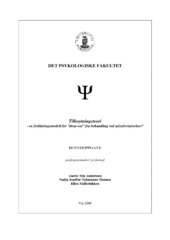Tilknytningsteori - en forklaringsmodell for "drop-out" fra behandling ved spiseforstyrrelser?
Master thesis
Permanent lenke
https://hdl.handle.net/1956/2885Utgivelsesdato
2008-04-15Metadata
Vis full innførselSamlinger
- Faculty of Psychology [527]
Sammendrag
Research on what constitutes drop-out from psychological treatment of eating disorders has until recently been scarce, despite the fact that about 50 % of the patients with this life threatening illness drop out. There have been made attempts to explain the high dropout rates, and among these, the major focus has been on patient characteristics. This study encompasses a comprehensive literature review of existing research evidence on drop-out. The review found few consistent variables that can be used to explain the drop-out. However, relational variables showed a possible influence on drop-out. In the absence of a theoretical framework in the abovementioned research, this study has tried to apply attachment theory to explain drop-out from treatment of eating disorders. About 96 % of the patients with eating disorders have been classified with an insecure attachment style. Thus, the attachment perspective might generate a deeper and more profound understanding of drop-out. An insecure attachment style influences the patients’ ability to establish and maintain meaningful relationships, which in turn will have implications for the patient-therapist relation and, hence, constitutes an increased risk of dropping out. The thesis ends with a discussion whether attachment theory is sufficient to explain drop-out from psychological treatment of eating disorders. Frafall i behandling av spiseforstyrrelser, "drop-out", har inntil nylig vært et lite utforsket område, til tross for at opptil 50 % av pasientene med denne livstruende lidelsen dropper ut. Det har vært gjort forsøk på å forklare frafallet ved hjelp av ulike mekanismer. Blant disse har hovedfokus vært på pasientkarakteristika. Denne studien innebærer et omfattende litteratursøk av aktuell forskning på "drop-out", som har vist at det foreligger få konsistente variabler som kan forklare "drop-out". Relasjonsvariabler viste imidlertid en mulig innvirkning på "drop-out".I mangel på et overordnet teoretisk rammeverk i den overnevnte forskningen, har denne studien søkt å anvende et tilknytningsteoretisk perspektiv for å få en bredere og mer nyansert forståelse av "drop-out" fra behandling av spiseforstyrrelser. Bakgrunnen for dette er at om lag 96 % av pasienter med spiseforstyrrelser har en usikker tilknytningsstil. En usikker tilknytningsstil vil påvirke pasientenes evne til å danne og opprettholde relasjoner, som i så måte vil ha implikasjoner for pasient-terapeutrelasjonen. Dette tenkes å gi en økt risiko for "drop-out". Avslutningsvis i oppgaven problematiseres det hvorvidt tilknytningsteori er tilstrekkelig for å forklare "drop-out" fra behandling av spiseforstyrrelser.
Utgiver
The University of BergenOpphavsrett
Copyright the author. All rights reservedThe author
